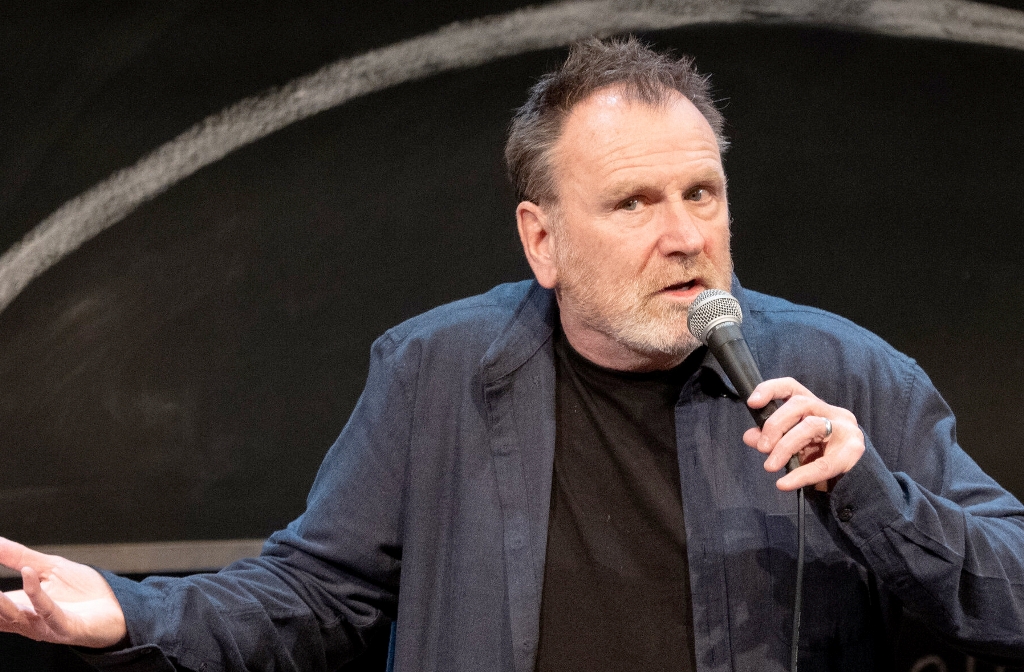COLIN QUINN: SMALL TALK
Written and Performed by Colin Quinn
Directed by Bobby Moresco
Returning March 30
Greenwich House Theater
Official Website
Reviewed by David Spencer
I like Colin Quinn, I genuinely do. He’s a gifted performer, a smart, funny comedian, he holds an audience, he gets big laughs and he can sustain a themed set for 80 or more intermissionless minutes, which he has done on-and-off-Broadway four times since 2010, including the current show. (I discount the first, An Irish Wake, a bit of co-authored autobiography that was really a one-man memory play. He owns it, but another actor credible to the material, could deliver it.) And where comedy is concerned, given a general audience and a mainstream voice, standup is perhaps the most democratic form of humor. If they laugh, solidly and consistently, it’s funny. That’s unequivocal. And his current thematic musing elicits the usual result.
I looked up my reviews of his three previous shows.
For the first I wrote:
As always, Quinn is a great raconteur-performer, his oft-brilliant material stamped with a singular imprimatur; and as always, he makes the audience very happy. And as always, for me, about 45 minutes in, I start to check out, even though I promise myself it’ll be different this time. I have no explanation for this other than that Quinn isn’t really pursuing a narrative, he’s exploring a point of view, umbrella topic and subtopics; and after 45 minutes it’s like too much dessert, or too rich a dessert, the topic association loses me and I struggle to keep up till the end. I’ve discussed this with a few other people and discovered, surprisingly, that I’m not alone.
For the second (and third) I wrote/recycled:
[The thematic premise] is a funny idea, and within, there are some funny riffs, but as with most stand-up routines, there’s a certain stream-of-consciousness threading that ties the components together, and so the focus of the piece isn’t always as sharp as it promises to be—with the result that one’s own focus can waver. Which is not to say that Quinn is bombing or loses laughs. Enough of the audience stays with him to give the impression that, whatever may be true about the over-arching thesis, he’s still, moment-to-moment, on his game.
Small Talk doesn’t change the game, only the thematic prtemise, which an examination of linguistic tropes; what the phrases we all know (and use) really mean and the use to which we put them. (Such as “I’ll let you go,” to end a conversation, which makes it sound like you don’t want to impose further, when really you want to get the hell out.) This time, however, I didn’t exactly check out. Quinn’s pattern established, I arrived bracing myself for the challenge. So I stayed with essay. Kind of. I don’t think I missed anything.
But as always before, I kept losing my moorings, as if I was adrift and swimming against a tide to get back to the dock. So I felt as if I was missing stuff even as I was hearing it and clocking it. A bit like being in a dream state.
The only new insight I have is this: George Carlin never failed to hold my attention and he was just as deeply into long-game thematic exploration. But I think the difference is that Carlin didn’t merely riff on his themes, he developed them the way you’d spin out a plot; the development was the de facto story. You followed the narrative, which was that of a man particularizing his increasing cynicism about the bullshit that modern society holds dear. Which created tension between the monologist and the theme.
More than that—Carlin claimed his point of view! He took a side! He reveled in his own iconoclasm. He didn’t give a rat’s hairy butt who he might offend by calling out absurdity and hypocrisy, in politics, religion or societal standards. And that made an evening with him cathartic.
Colin Quinn, for all his prodigious skill and craft…plays it safe. He’s a both sides guy. He tackles controversial subjects and woodsheds the controversy, leaving only a husk of mild absurdity to poke fun at. So while his stuff contains observational pith, it lacks responsive teeth. He’s a bar room pundit.
And you know what? There’s a place for that. Obviously, because he keeps coming back with new shows—and audiences keep laughing.
I just can’t seem to get used to the idea that I shouldn’t expect more of him…
